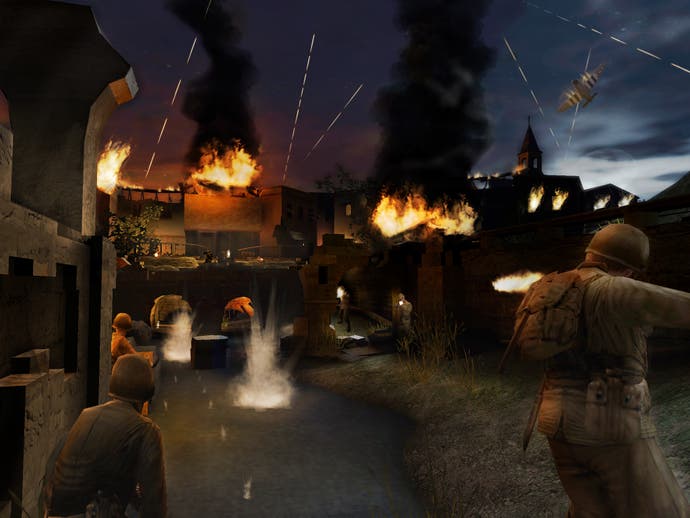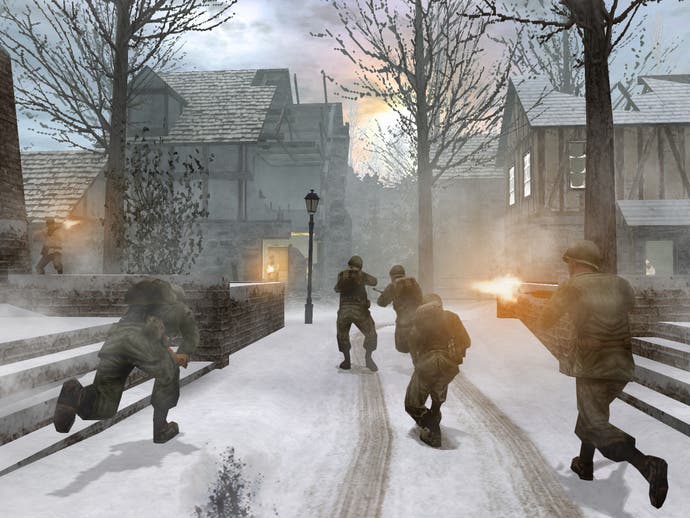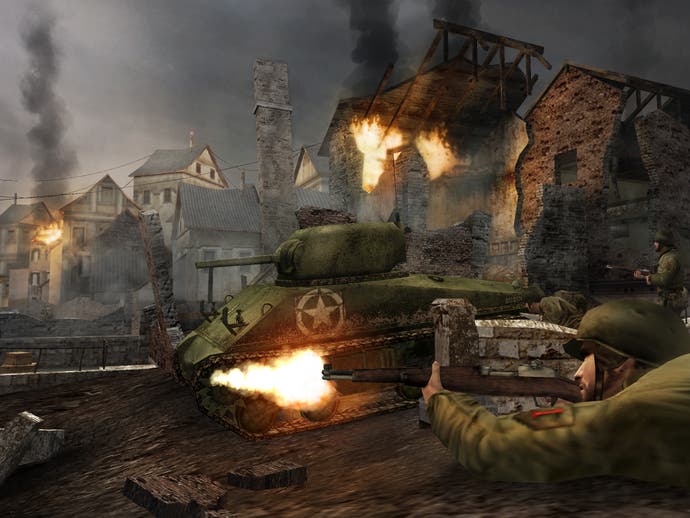Call of Duty 2: Big Red One
Might the Xbox version be even better than the 360Ą¯s?
As I check the time on my mobile phone before I start writing, I notice that it’s 11:11. Normally, seeing this time reminds me what a complete idiot Uri Geller is, but today, having spent the last few days playing the console Call of Duty sequel, it makes me think about... well, nothing really. A good way to start the review?
Call of Duty 2: Big Red One does not command the awful majesty of the very first CoD on the PC. Infinity Ward’s original gained its notoriety through a combination of excellent FPS scripting, and a sense of the pure horror of being in a war. You were anonymous, surrounded by the anonymous. People died all around you, American, British, Russian, German, just green teenagers, first running, then lying very still, each expendable. Even your player character did not survive the chapter changes, as you switched from nation to nation, exploring significant moments from the catastrophic Second World War. You were a nobody with a gun, fighting nobodies with guns, and the agonising futility provided balance to the game’s focus on intense action.
Treyarch’s Big Red One (to clarify, as it’s confusing: Call of Duty 2 is a new release on PC and Xbox 360, whereas Call of Duty 2: Big Red One is an entirely separate game for PS2, GameCube and Xbox), while following the action ethos of the series, does not possess the same emotional scale. Although there’s a fair chance they never intended to.
Featuring the cast of the BBC/HBO series Band of Brothers, BRO is about personalities. It is the micro to CoD’s macro. The Big Red One were the First Infantry Division of the US army. Formed during WWI, their name came from the red material they sewed to their uniforms after tearing it from the uniforms of fallen German soldiers. They were the elite, the US army go-to guys, and played a large role in many events between 1942 and 1945. As such, they are an ideal group to follow through the traditional CoD multi-national pathway.

Beginning in North Africa, through Tunisia and Libya, and then going into Italy, France, Belgium and Germany, BRO picks out significant manoeuvres and specialist tasks, based on historical record and the interviews the team did with surviving veterans. There’s no doubting the veracity of the events. However, because BRO is more interested in the personal, even this is played down in favour of the squad’s banter.
There are five or six key characters surrounding you, each invincible in battle unless the script says otherwise. The emotional involvement is clearly intended to come through the camaraderie, and their surprise deaths a painful shock. Unfortunately, this doesn’t work particularly well for a couple of reasons. Firstly, the script, while well written and excellently performed (boosted by superb team-based motion-capturing), doesn’t spend enough time introducing you to the soldiers, and while their names float about when your cursor waves over them, they're not obvious during the frequent in-game cut-scenes, meaning it’s very hard to remember who’s who, and hence really care who’s who. Secondly, you don’t have a name or a voice. So in this group of gobby men, you stand silently, watching, always feeling detached.
But here’s some good news: none of that matters. Because this is one kick-ass awesome FPS(TM).
Heavily on-rails, there’s rarely a single moment when you have a choice about which direction you should run. But, uh, you’re in the army, in a war. There’s only one direction you should run. Run, fool! This understanding is executed via the utterly superb level design. The reason you don’t try and run behind the shed, or the wrong way down the bunker, is because you absolutely don’t want to. Meet a crossroads, you pick a direction, and the action continues. Should you die and retrace those steps, you might pick another path just out of curiosity, and realise it’s a dead end. But you’d never have gone that way first time, no matter how smart you think you’re being. It’s as if the game has you on an invisible lasso, pulling you in the direction it wants you to go, but without ever giving you the sensation of being tugged.
As the consoles give birth to their successors, the last releases on the retiring parents are naturally going to suffer in comparison. But BRO is an exception. It looks beautiful. Treyarch has squeezed every bit of power out of the aging machinery, managing to have dozens of enemies on screen at once, while fires rage, smoke billows, and planes fly overhead. It doesn’t stagger, it doesn't blip. The intensity of the surroundings is remarkable. Coupled with the enormous variety in weaponry, each satisfyingly different to fire, the action-action-ACTION! atmosphere is rarely suppressed.

The nature of that action is pleasingly broken up. Almost straight away you find yourself awkwardly steering a tank along dusty African roads, kaplowing the enemy forces. Later you’re shooting planes out the sky (with awesome explosions) on the back of a truck, and then dashing about the various weaponry of a plane in a splendid aerial battle. In the middle of sieging a building, you’ll suddenly find yourself ordered to grab a rocket launcher and take out oncoming tanks, before sneaking up and attaching explosives to the sides of enemy firepower. Then it will be just a matter of surviving the length of a road with nothing but a rifle, before defending an engineer as he takes out a wall. It’s pretty much seamless throughout, but plenty mixed-up to prevent that FPS run-and-gun boredom setting in.
Issues arise with the mentioned invulnerability of your squadmates. Interestingly, it’s not by a lack of realism - they frequently get hit, show damage, and retreat from the front. Never once did I think, "how is he not dying?". Instead, it’s your inability to kill them that becomes an issue. While accidental friendly fire will result in a game over, it’s tough to achieve. If you aim your gun at an ally’s head, it just won’t fire. Of course, this isn’t some crazed complaint by a frustrated double-agent Nazi - this is about when they decide they’re going to stand immediately in front of you while you’re trying to take out the enemy machine gun. Suddenly you’re helpless, your gun won’t fire, and you’re trapped between the soldier and some rubble. And this happens frustratingly frequently. Not game-breakingly frequently, but enough to have you shouting, "Get out the way, you bloody idiot!" while your life is chipped away. This said, otherwise their AI is sterling, using that of the original PC Call of Duty. The enemies’ is a little poorer, as often leaving them standing around waiting to be shot as it has them sensibly hide.
Probably the very hardest part of designing a scripted FPS with non-playable squad-mates is ensuring that you feel a significant role in the action. Here BRO shines more brightly than any other star. While there are occasions when you realise that the entire Second World War has paused for you to run to the appropriate corner, this is mostly beautifully disguised. Fellow soldiers will happily do a lot of the work for you, if you’re too lazy to help. But if you’re there, they won’t spoil it for you. It’s hard to understand quite how Treyarch achieved this, but I’m damn grateful that’s their job rather than mine. It does occasionally glitch, and when it does it looks really stupid - you join the squad standing peacefully in a room, having been picking off a sniper or somesuch, and discover that they’re amiably hanging out with a German intent on murdering only you. It’s a frame-breaker, but thankfully only very occasional.

Environments change pleasingly quickly, and even the extensive sequences in dusty North Africa don’t grow over-familiar. France, it turns out, does look different to Belgium. And the variety in mission structures ensures that you’re never running through ‘just another town near some fields’.
It’s visceral, rather than technical. Yes, the weapons are accurately recreated, and yes, these are historical events. But this is the detail that can only be missed, rather than appreciated when present. It is the hum of the air conditioning, appreciated when on, but only noticed when it disappears. Taken for granted, they allow an intense, explosive and captivating FPS journey through the private vision of America’s best soldiers.
But its failure to create the empathic squad it so clearly wishes it had leaves an inescapably hollow feeling. More than anything, it’s why BRO doesn’t quite scrape a 9. All the excellence described above is, in the end, reduced down to process. You don’t mind that it’s on rails, but you’re still semi-consciously aware that yours is a heavily fated life. When a soldier dies in a scripted scene, the lack of feelings generated as the sweeping violins drift in leaves you feeling autistic. Which one died? Uh, was he the one who told jokes? Do I even care? I suppose I’d best keeping firing at the other off-green guys. The second time you see it, because you died moments later, it just looks daft.
This is a fine swansong for a generation of consoles. It seems very doubtful that a better FPS will come out before they fade into obscurity. It's a fine, fine shooter, capturing a micro scale in a macro story, with a remarkable capacity for maintaining alert attention. It doesn’t do justice to its namesake’s remarkable emotional honesty, but it does more than enough to be worth your while checking out.


